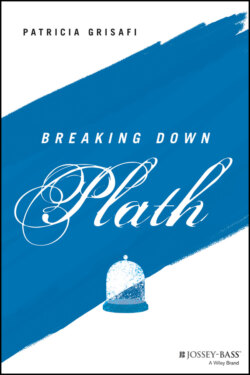Breaking Down Plath

Реклама. ООО «ЛитРес», ИНН: 7719571260.
Оглавление
Patricia Grisafi. Breaking Down Plath
Table of Contents
List of Illustrations
Guide
Pages
BREAKING DOWN PLATH
Foreword
Acknowledgments
About the Author
Introduction
Chapter 1 Who Was Sylvia Plath? PLATH'S CHILDHOOD
A SCHOLARSHIP GIRL
THE RISKS OF READING AUTOBIOGRAPHICALLY
A TURNING POINT
MEETING TED HUGHES
GROWING AS A WRITER
THE CREATION OF PLATH THE MYTH
THE TROUBLE WITH BIOGRAPHY
Chapter 2 Plath in Her Historical Context
COLD WAR CULTURE
GENDER AND SEXUALITY
MENTAL HEALTH
ON THE EVE OF SECOND WAVE FEMINISM
Chapter 3 Plath's Poetry. INTRODUCTION TO THE POEMS
PLATH'S INFLUENCES
POETRY AS POLITICS
RECURRING THEMES IN PLATH'S WORK
Bees and Beekeeping
Domesticity
Flowers
The Holocaust
Mental Health
Motherhood
Nuclear War
Popular Culture
Rebirth
The Sea
The Self
Violence
Writing
THE POETRY
“The Thin People” (1957) Themes: The Holocaust, Violence
“Full Fathom Five” (1958) Themes: Rebirth, the Sea, the Self, Writing
“Point Shirley” (1959) Themes: Domesticity, the Sea
“The Colossus” (1959) Themes: The Self, the Sea
“Face Lift” (1961) Themes: Domesticity, Mental Health, Rebirth, the Self
“Morning Song” (1961) Themes: Motherhood, the Self, Writing
“Tulips” (1961) Themes: Flowers, Mental Health, Rebirth, the Self
“Elm” (1962) Themes: Domesticity, Motherhood, the Self, Writing
“The Applicant” (1962) Themes: Domesticity, Popular Culture
“The Rabbit Catcher” (1962) Themes: Domesticity, Violence
“Stings” (1962) Themes: Bees and Beekeeping, Domesticity, Rebirth, the Self, Violence, Writing
“Fever 103º” (1962) Themes: Flowers, Nuclear War, Rebirth, the Self
“Daddy” (1962) Themes: The Holocaust, Mental Health, Rebirth, the Self, Violence, Writing
“Lady Lazarus” (1962) Themes: Domesticity, the Holocaust, the Self, Violence, Writing, Rebirth
Poetry Terms Defined (from The Bedford Glossary of Critical and Literary Terms)
Chapter 4 The Bell Jar, Short Fiction, and Essays. INTRODUCTION TO THE FICTION
THE BELL JAR
Conformity Culture
Domestic Oppression
#MeToo and The Bell Jar
The Rosenberg Execution
A Mental Health Coming‐of‐Age Novel
Publication History
SHORT FICTION AND ESSAYS
“Superman and Paula Brown's New Snowsuit” (1955)
“Johnny Panic and the Bible of Dreams” (1958)
“Ocean 1212‐W” (1962)
“Snow Blitz” (1963)
Literary Terms Defined
Chapter 5 Plath's Journals and Letters
AUDIENCE AND SELF‐FASHIONING
WITNESSING THE CREATIVE PROCESS
WRITING AS AN OUTSIDER
Chapter 6 Plath's Legacy
CULTURAL INFLUENCE
THE GROWTH OF PLATH STUDIES
FAMILY LEGACY
SUMMARY
SUGGESTED READING
Bibliography
Index
WILEY END USER LICENSE AGREEMENT
Отрывок из книги
PATRICIA GRISAFI
Surely the great use of poetry is its pleasure—not its influence as religious or political propaganda. Certain poems and lines of poetry seem as solid and miraculous to me as church altars or the coronation of queens must seem to people who revere quite different images. I am not worried that poems reach relatively few people. As it is, they go surprisingly far—among strangers, around the world, even. Farther than the words of a classroom teacher or the prescriptions of a doctor; if they are lucky, farther than a lifetime.
.....
Plath believed she had finally met her equal—someone who was smart, strong, creative, and passionate about writing—but the relationship was often volatile. They married after four months in a quiet ceremony and kept the marriage secret (Plath was worried she might lose her Fulbright if the marriage was discovered). The marriage was exceptionally literary from the get‐go. Plath and Hughes settled into a routine of writing and reading each other's work. Much of the time, however, Hughes would write and Plath would act as his secretary, sending out his poetry. He even won an important poetry contest that he didn't know Plath entered on his behalf. However, Hughes did support Plath's writing goals and encouraged her to write. In this way, the two had a more equitable artistic partnership than most.
In the 1950s—even in progressive artistic circles—there was still a sense that men dominated the world of work. Mostly, women were relegated to a more domestic experience: providing support for their husband, taking care of the home, and raising the children. It might be seen as a bonus to have a clever wife who would write sometimes. But Plath bristled against losing her identity as a writer to household drudgery.
.....